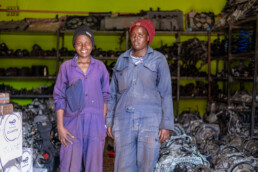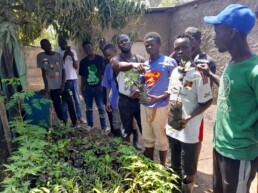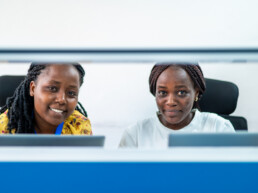At just 24, Jecinta has already rewritten the narrative that society expected of her. A single mother from Nakuru County, she once earned a living as a hairdresser, working out of a modest home salon to provide for her daughter. Today, she’s a qualified automotive mechanic—confidently repairing engines, breaking stereotypes, and building a more stable future.
Her transformation is one of hundreds made possible through SHOFCO’s Sustainable Livelihoods Program, which equips young people—especially women and marginalized youth—with practical skills, mentorship, and job readiness training to thrive in Kenya’s evolving economy.
I went from combing hair to fixing engines. I’ve proven that women can thrive in any field.
A New Kind of Workforce for a New Kenya
Kenya’s population is rapidly urbanizing, with over 28% of the country’s population now living in cities—a figure projected to reach nearly 40% by 2040. This shift is straining traditional employment pathways, particularly for young people. Youth unemployment remains high, with estimates from the Kenya National Bureau of Statistics placing it at 13.4% in 2023—significantly higher in informal settlements.
The stakes are especially steep for women. Despite progress in education and entrepreneurship, many young women still face entrenched gender barriers when entering technical or male-dominated trades. According to UN Women, only 16% of Kenyan women are employed in formal wage jobs, and women are twice as likely as men to be in vulnerable employment.
Jecinta’s story is a powerful counter-narrative.
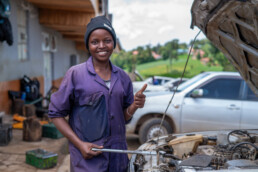
Pushing Past Doubt—With Purpose
Her motivation was simple and fierce: her daughter. “Every challenge I faced, I reminded myself why I started—so I could build a future for her.”
Stepping into a mechanic’s workshop for the first time was daunting. The tools were unfamiliar, the jargon confusing, and the male-dominated space intimidating. But she took it step by step. “Each time I fixed a part of an engine, I gained confidence,” she says. “The grease on my hands became a symbol of progress.”
Support Beyond Skills: SHOFCO’s Livelihoods Approach
SHOFCO’s approach goes far beyond technical training. Participants like Jecinta benefit from holistic support, including:
- Job readiness and financial literacy training
- Mentorship and coaching from industry professionals
- Supportive peer networks
- Linkages to apprenticeships and employment
This integrated model has proven powerful. SHOFCO currently supports over 140,000 youth annually through livelihoods and vocational training programs across Kenya. Many, like Jecinta, go on to earn more than they ever have before, building pathways to financial independence and stability.
I now earn more than I ever did as a hairdresser. I can pay my daughter’s school fees and even save for the future—something I never imagined a year ago.
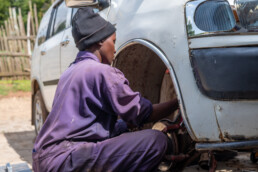
Challenging Norms, Creating Space
Working in a garage still comes with its challenges. Some clients express doubt, others make assumptions. But Jecinta meets skepticism with quiet defiance.
I just smile and say, ‘Watch me.’ Actions speak louder than words. I dream of opening my own garage one day, one that caters specifically to women. A space where they feel respected and welcome.
What began as a personal journey has become something much larger: a symbol of change. Every surprised client, every supportive friend who once doubted her, every young woman who sees what’s possible—Jecinta is shifting perceptions about women in trades.
As Kenya—and Africa more broadly—invests in youth employment, urban resilience, and inclusive growth, stories like Jecinta’s hold urgent relevance. The World Bank estimates that 10-12 million youth enter the African workforce each year, but only 3 million formal jobs are created. Investing in skills training, especially for young women, is not just an equity issue; it’s an economic imperative.
“Find a skill you love and pursue it fearlessly,” Jecinta says. “Financial independence begins with believing you can thrive in any profession—even the ones you’ve been told are not for you.”
